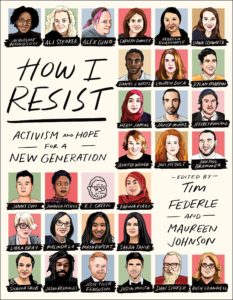Book Review: How I Resist edited by Tim Federle & Maureen Johnson
Disclaimer: I received this advance uncorrected proof through a Goodreads giveaway for the purpose of writing this review. No other compensation was offered or requested. As an uncorrected proof, there will be significant changes between this and the final product.
As I write these words, yet another school shooting has sparked an upsurge in student activism. Thus the appearance in my mailbox of this collection of essays and interviews on activism and hope aimed at the young adult market was timely. The selection of authors and artists includes such popular figures as Jodi Picoult and Javier Muñoz, plus a wide variety of folks I have never heard of but younger Americans may be more conversant with.
The first essay in the book is “Could We Please Give the Police Departments to the Grandmothers?” by Junauda Petrus which waxes lyrical about solving crime problems with stern looks and good food. Very Afrofuturism. Last is Karuna Riazi with “Refilling the Well”, which is about her emotional self-care while trying to change the world for the better.
One of the hazards of reading such an early proof of the book is that none of the interior illustrations are present, including the ones that are a contributor’s entire entry. Also, there’s a comics trivia error in Maya Rupert’s essay about imagining a black Wonder Woman that I can’t tell if it’s the author’s or a typesetter glitch. (Have I mentioned that I’m an annoying nerd about comics trivia?)
I do, however, like the cover with all the author bio pictures. It does a good job of giving faces to the people writing and drawing these pieces.
This is a collection curated through a strong political lens for a particular type of young person. If you are the sort of young adult who thinks the right person won in 2016 (Hillary’s loss hit several of the contributors hard); that America’s problems are caused by uppity women, dark-skinned people and “weirdos” being allowed to have a say; and that protests are only acceptable when you don’t have to see them, hear about them or be influenced by them in any way…this book will not go well with you.
Most of the contributions are interesting or thought-provoking–I’m a bit disappointed by Rosie O’Donnell going with a glorified tweet. The editors have an introduction, mid-word and afterword, which is a bit much, and they come off as trying too hard to be “woke” and “down with the young people.”
There’s a list of suggested reading in the back, ranging from 1984 to We Should All Be Feminists.
Consider this one as a gift for a teenager or college student who’s into political or social activism. Older readers might want to pick it up if you are a fan of one of the contributors.

